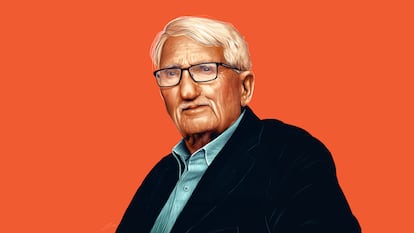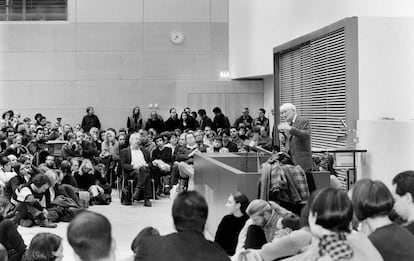Jürgen Habermas: The important thinker’s rise to the pinnacle of philosophy
Europe’s greatest intellectual publishes a monumental 1,752-page work that takes a look at the history of philosophy. He is a part of it thanks to his theory of deliberative democracy

Jürgen Habermas, 94, is one of the few living philosophers to transcend intellectual fads, and he remains as present today in the public sphere as when he appeared as a young theoretician enragé in the student movements of the late 1960s. On the occasion of his 80th birthday, philosopher Ronald Dworkin said of the Düsseldorf native: “Not only is he the most famous living philosopher in the world, but his own fame is famous.” I would argue that his fame is far greater than knowledge about his complex theory is. More than anything else, Habermas owes his celebrity to his indefatigable need to opine on every event that moves public opinion at any time; that is to say, his fame is more because of his role as an intellectual than because of his intricate philosophy. I would not be surprised if, at 94 years old, he surprises us with a text on the current situation in Palestine, as he did with the war in Ukraine and with all previous wars and conflicts, with the relationship between philosophy and religion, with the debates over biotechnology, the defense of the EU from a perspective of federal integration, and the more specifically German issues of reunification and the critical management of the Nazi past and the Holocaust. And on and on and on.
In Germany, Habermas is as solid a national icon as the Brandenburg Gate. In 2019, on the occasion of his 90th birthday, a veritable collective tribute to him was organized and surrounded by unusual media hype. Germany is a country that loves its intellectuals, perhaps because they are becoming increasingly rare. The fact that this birthday coincided with the launch of a 1,752-page book in which he reviews the entire history of philosophy of the last 2,500 years, beginning with the “axial era” (in the words of Karl Jaspers), the moment when the first evolved religions began to consolidate, elicits a mixture of admiration and incredulity. Since then, he already published a new book — A New Structural Transformation of the Public Sphere and Deliberative Politics (originally published German in 2022 and in English in 2023) — and apparently has another one in the works. It’s just more fodder to feed a myth that was born when, at the age of 24, he published his article “Thinking with Heidegger against Heidegger” in the Frankfurter Allgemeinen Zeitung, which caused a sensation. At the time, no one could have imagined that this daring and sharp-tongued young man would become the successor of the old curmudgeon from the Black Forest in the canon of great German philosophers, the “Hegel of the Federal Republic.”
A restless and hyperactive theoretician
Habermas spent his childhood in Gummersbach, near Cologne, where his father headed the Chamber of Commerce and Industry and therefore implicitly collaborated with the ruling regime, even though he was a liberal. During the war, he enlisted in the Hitler Youth, although he never took part in the war. The war and Nazi totalitarianism in general, however, left a deep impression on Habermas that immediately inclined him toward a firm commitment to democracy and he felt enormous distrust toward those who readapted after the war without purging themselves of their previous responsibilities. For half his life, he was associated with the Frankfurt School, joining its Institute for Social Research in 1955 at Adorno’s initiative, although Habermas stayed at that institution for less than four years. He soon had disagreements with its director, Max Horkheimer, who considered him too left-wing. Habermas has always recognized himself as a disciple of Adorno, whom he deeply admired, but he soon began to forge his own path. He was too free and restless to categorize within a school. In fact, in his first impactful book, The Structural Transformation of the Public Sphere: An Inquiry into a Category of Bourgeois Society (1962), he already began to separate himself from his presumed masters by radically reinterpreting the Enlightenment. Far from being satisfied with the defeatist and dead-end critique of his elders, who were more inclined to focus on the pathologies of modernity, Habermas turned to a more optimistic vision. He evaluated modernity as an “unfinished project,” not the deformed culmination of a process that was intended to emancipate man but instead ended up becoming its opposite: a new form of anonymous and ungraspable power. While he was attentive to modernity’s distortions, Habermas soon emerged as the great defender of the Enlightenment project, even after the spectacular emergence of French poststructuralist philosophy.

From then on, Habermas sought to locate normative criteria on which to base a critical social theory adapted to the new conditions of “late capitalism.” He was well aware that it was not enough to rely exclusively on the tradition of neo-Marxist philosophy and social analysis; it was also necessary to draw on contributions from various fields of specialized knowledge. It was clear to him from the outset that it is not possible to arrive at a new theory of rationality without contributions from philosophy and all the social sciences. That began a restless adventure marked by an alchemy and intellectual flexibility that allowed him to integrate elements from others into his own theory, helping him achieve those ends. Thus, Habermas critically reappropriated the theory and philosophy of liberal democracy. In the process, he specifically reconstructed the necessary institutional and normative presuppositions underlying the public dimension of reason, as initially formulated by Kant; Habermas developed an ethics of discourse that he elaborated with K. O. Apel; and he promoted re-readings of Weber, Parsons and Luhmann, as well as re-readings of pragmatism and contemporary philosophy’s “linguistic turn.”
He achieved all this while he was establishing himself in academe. In 1964, he became the chair of Social Philosophy, which Horkheimer had held until then, and in 1971 he was appointed director of the Max Planck Institute for “research into the living conditions of the scientific-technical world,” a position Habermas occupied until 1983, when he returned to his chair in Frankfurt, from which he retired in 1993. His reputation as a polemicist was a constant throughout his career, and not only because of the aforementioned journalistic interventions, among which I would highlight the “historians’ debate” on the German Nazi past, the debate he had with Sloterdijk on genetic manipulation and all the ones about the role of the EU. Of his public debates, it is worth emphasizing the one he had with Cardinal Joseph Ratzinger (who would later become Pope Benedict XVI) on reason, religion and secularism, a theme he enthusiastically embraced after the 9/11 attacks. His stand-out academic disputes include those over positivism, Luhmann’s systems theory and postmodern philosophy, although Habermas never missed the opportunity to have lunch with Michel Foucault when he went to Paris. Debating was always his way of life, and he told a student who wanted to interrupt their discussion of his paper to go to lunch that “discussion is more important than eating.”
The philosopher nourishes the intellectual
Habermas’s irrepressible urge to be involved in almost every public debate is not just one of his personality’s main features; it is a natural extension of his theoretical premises. It is not an accident that he is the great architect of the theory of deliberative democracy, that constant exercise of enlightenment among free and equal citizens who dissolve their differences with arguments in a process of constant deliberation. Such debate must always be oriented toward mutual understanding and take place under conditions that ensure perfect inclusion and symmetry among those who deliberate. The assumption is that, in the end, the best argument will prevail. Clearly, political communication in our public space is far from this ideal, something that Habermas has always decried. In these post-truth times, amid the proliferation of fake news, tribal epistemology, rampant emotionalization and a thousand strategies to condition opinion, there has already a complete departure from these normative assumptions. This change prompted Habermas to write his latest book, Ein neuer Strukturwandel der Öffentlichkeit... Public reason, the Enlightenment’s great achievement, has dissolved behind social media noise and manipulation.
Nevertheless, it at least provides a normative template that allows us to assess the extent of the mess and can offer us support for our criticism. Over the years, Habermas wove this template into his work until it culminated in his theory of communicative action, which will go down in the history of philosophy; it is based on language’s centrality as the natural medium of communication and understanding, but which is also the medium of concealment, deception and the interests of power. To access rational communication and eliminate the aforementioned distortions, it is enough to analyze our habitual communicative practices. In them, we continually raise claims about the validity of facts, norms and experiences, which we try to justify or legitimize by resorting to arguments that we subject to interactions with others; we subject them to the practice of “intersubjectivity.” Habermas does that, and only that, in his public interventions and academic activity, seeking to water down his pronouncements in a dialogue that always aspires to reciprocal understanding.
In Also a History of Philosophy (published in August of this year), his monumental book in which he goes through the entire life of the spirit, Habermas does not seek to overwhelm us with his undisputed erudition; instead, his aim is to elucidate what philosophy’s role may be at a time when science’s expansive vision and continuous specialization threaten to divert us from what should be its fundamental objective: to orient us about the world in which we live, enlighten us on how to face the contemporary world’s challenges and to help us achieve the “autonomous use of reason” to decide who and how we wish to be. These have always been the questions that have marked Habermas’s extraordinary intellectual life.
Sign up for our weekly newsletter to get more English-language news coverage from EL PAÍS USA Edition
Tu suscripción se está usando en otro dispositivo
¿Quieres añadir otro usuario a tu suscripción?
Si continúas leyendo en este dispositivo, no se podrá leer en el otro.
FlechaTu suscripción se está usando en otro dispositivo y solo puedes acceder a EL PAÍS desde un dispositivo a la vez.
Si quieres compartir tu cuenta, cambia tu suscripción a la modalidad Premium, así podrás añadir otro usuario. Cada uno accederá con su propia cuenta de email, lo que os permitirá personalizar vuestra experiencia en EL PAÍS.
¿Tienes una suscripción de empresa? Accede aquí para contratar más cuentas.
En el caso de no saber quién está usando tu cuenta, te recomendamos cambiar tu contraseña aquí.
Si decides continuar compartiendo tu cuenta, este mensaje se mostrará en tu dispositivo y en el de la otra persona que está usando tu cuenta de forma indefinida, afectando a tu experiencia de lectura. Puedes consultar aquí los términos y condiciones de la suscripción digital.









































